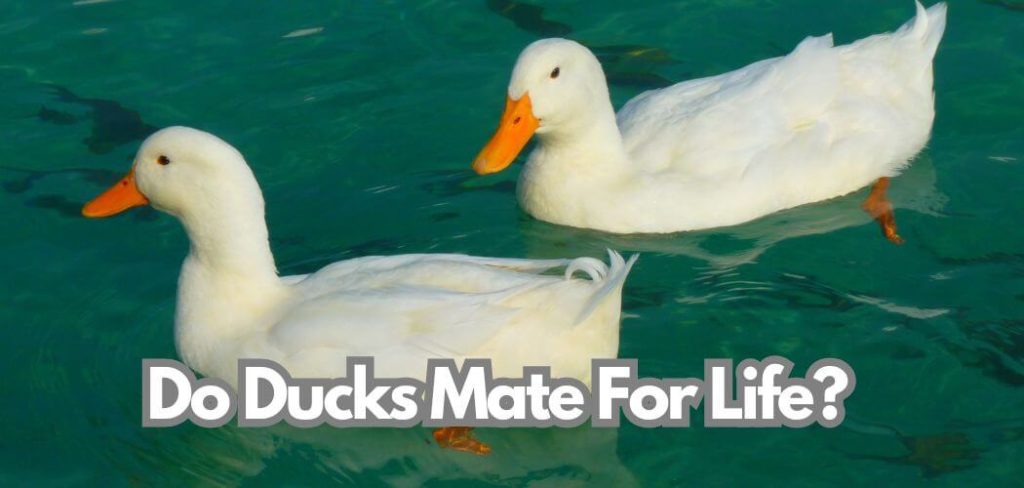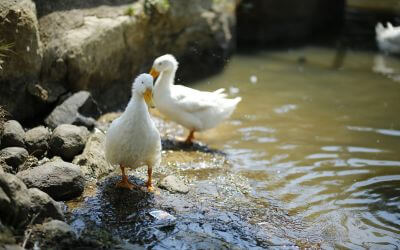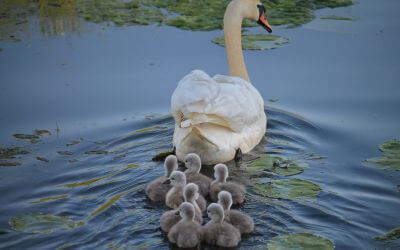Ducks are a common sight in many bodies of water, from ponds to lakes to rivers. They are known for their distinctive quacks and their ability to swim and dive with ease.
But one question that often arises when observing these birds is whether or not they mate for life.

Do Ducks Mate for Life?
Yes, ducks are well-known for their monogamous behavior, which has led many people to the common belief that they mate for life. However, studies have shown that not all ducks mate for life.
While many duck species do form long-lasting pair bonds, these bonds are not necessarily permanent.
Studies have shown that up to 40% of duck pairs will separate and find new mates in any given breeding season.
There are several reasons why ducks may choose to switch partners. For example, if a pair is unsuccessful in breeding or raising young, they may decide to go their separate ways and try again with new partners.
Additionally, if one member of a pair dies, the surviving duck may seek out a new mate.
It’s also worth noting that not all duck species are monogamous during breeding season.
Some, such as the Wood Duck, are known to engage in polygamous behavior, with males mating with multiple females.
While ducks may exhibit monogamous behavior, it’s important to remember that this does not necessarily mean that they mate for life with the same partner.
Just like many aspects of animal behavior, the reality is more complex than simple stereotypes may suggest.
Monogamy in ducks:
Ducks are known for their monogamous behavior, which means they mate with only one partner for the duration of the mating season.
This behavior is not universal across all duck species, but it is prevalent in many of them.
Factors that influence monogamy:
Monogamy in ducks can be influenced by several factors. One of the most significant factors is the availability of resources.
When resources are scarce, ducks tend to form monogamous pairs to ensure that they have a better chance of survival.
Another factor that influences monogamy in ducks is the presence of predators. When predators are around, ducks tend to form monogamous pairs to increase their chances of survival.
The presence of predators can also lead to increased parental investment, which is beneficial for offspring survival.
Differences in species behaviors:
Mating for life in ducks is not universal across all species. Some species, like the mandarin duck, are known for staying faithful and committed to one partner for life, while other ducks, like the wood duck, are not.

For species that exhibit monogamous behavior, pairs often engage in courtship rituals before mating.
These rituals can include head-bobbing, wing-flapping, and vocalizations. Once a pair has formed, they will often stay together for the duration of the mating season.
Ducks that mate for life VS ducks that mate for a season:
While many people believe that all ducks mate for life, this is not entirely true. While some species of ducks are monogamous and mate for life, others are not.
The following table lists some common types of ducks and whether or not they mate for life with one partner or if they only bond and mate for a season.
| Duck species: | Mate for life? | Mate for one season? |
| Mallard | No | Yes |
| Wood ducks | No | Yes |
| Muscovy | No | Yes |
| Pekin ducks | No | Yes |
| Pintail Duck | No | Yes |
| Paradise ducks | Yes | No |
| Mandarin ducks | Yes | No |
| Pacific black ducks | No | Yes |
| Bufflehead ducks | Yes | No |
| Cayuga ducks | No | Yes |
| Whistling duck | Yes | No |
| Golden eye duck | No | Yes |
| Ruddy ducks | No | Yes |
| Rouen ducks | No | Yes |
| Teal Duck | No | Yes |
| Merganser Duck | No | Yes |
| Harlequin Duck | Yes | No |
| Canvasback Duck | No | Yes |
As you can see from this table, some ducks are known to mate for life. However, even within species that are not monogamous, ducks often form strong pair bonds during the breeding season.
It is important to note that while some ducks may mate for life, this does not mean that they are always faithful to their partner.
Extra-pair copulation is common in many species of ducks, meaning that individuals may mate with multiple partners during the breeding season.
Overall, while some species of ducks are known to mate for life, it is not a universal trait among all types of ducks.
Do ducks mate with one partner for life or several?
Ducks are known for their monogamous mating behavior, which means they mate with one partner for an extended period. However, it is not entirely true for all species of ducks.
Some species of ducks, such as the Mallard, do not mate for life and may have several partners during the breeding season.
They form pair bonds that last only for the duration of the breeding season. After that, they may find a new mate in the following season.
On the other hand, some species of ducks, such as the swans, and geese, and some species of ducks like the Mandarin duck, are known for their lifelong monogamous mating behavior.
These species form pair bonds that last for a lifetime, and they remain loyal to their partners throughout their lives.
The reason behind the difference in mating behavior is not entirely clear. It may be due to environmental factors, social factors, or genetic factors.
However, research suggests that the species that live in stable environments and have low predation rates are more likely to mate for life.
What happens when a duck loses its mate?
When a duck loses its mate, it can have a significant impact on their behavior and well-being.
Ducks are social animals that form strong bonds with their partners, and losing a mate can lead to loneliness, depression, and even death.
Male ducks are known to become aggressive and territorial when they lose their mate. They may also become less interested in mating and may not display their usual courtship behaviors.
Female ducks, on the other hand, may become more vulnerable to predators and may have a harder time finding food and shelter without the help of their mate.
In some cases, ducks may form new bonds with other ducks after losing their mate. However, this can take time and may not happen immediately.
Does the male duck leave the female duck after mating?
Male ducks, also known as drakes, do not leave the female duck after mating. They often stay with the female duck, also known as a hen, during the incubation period and assist in raising the ducklings.
Male and female ducks form strong bonds during the breeding season, which can last for several months.

Once the mating season is over, the pair will stay together until the female duck lays her eggs.
The male duck will then remain with the female duck, taking turns to incubate the eggs and protect the nest.
During the incubation period, the male duck will leave the nest occasionally to feed and preen.
However, he will always return to the nest to take his turn at incubating the eggs. Once the eggs hatch, the male duck will continue to stay with the female duck and help care for the ducklings.
Final thought:
The differences in mating habits of various duck species are not fully understood.
It is believed that factors such as habitat, food availability, and attacks from predators may play a role in determining whether or not a species will mate for life.
Regardless of the reasons, the mating habits of ducks continue to fascinate bird enthusiasts and scientists alike.
Sources:
allaboutbirds: How to recognize duck courtship displays
a-z-animals: Duck Mating: Understanding the Reproductive Process of Ducks
